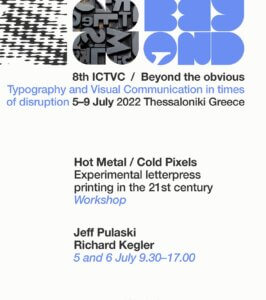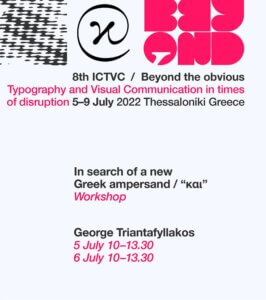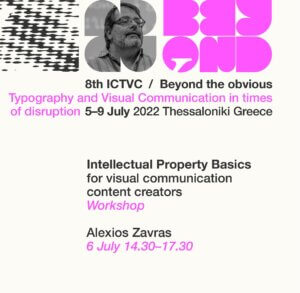Beyond the obvious
ICTVC 8 · Thessaloniki, Greece · 5 — 9 July 2022
Workshops
Please stay tuned for more information
Jeff Pulaski and Richard Kegler
5–6 July / 9.30–17.00 | both days
—

This two-day hands-on workshop is open to any skill level, from novice to experienced printer. Participants will take home individual prints as well as a collaborative group project. Working within the historic printing museum/workshop of Asterios Ch. Goussios, historic materials will be integrated with new contemporary tools to produce immediate relief prints under the guidance of Jeff Pulaski and Richard Kegler.
A life-long Kansan, Jeff Pulaski was born and raised in Newton, Kansas in the United States. He is currently the Director of the School of Art, Design and Creative Industries at Wichita State University. His letterpress collection includes various platen and cylinder presses, a Prouty Power Press newspaper press, an 18” Challenge paper cutter, a Model 31 Linotype and large assortment of metal and wooden type.
Richard Kegler formed P22 Type Foundry in 1994 and after starting the Book Arts Center in Buffalo, New York, became the director of the Wells College Book Arts Center in Aurora, NY. Richard has spent his career combining an interest in traditional printing crafts with entrepreneaurial initiatives. His current project Dry Inc. focuses on pre-digital printing and typography and new printing tool development.
place: TIPOGRAFIO ASTERIOU CH. GOUSSIOU
transportation will be arranged by ICTVC
George Triantafyllakos
5 July / 10.00–13.30
and
6 July / 10.00–13.30
—

Since the end of the 15th century, typesetters and printers employed a large and extremely diverse variety of ligatures to represent the Greek ampersand “και”. This complex collection of strange characters and shapes has been gradually forgotten and a simple kappa (κ) looking character has taken their place. Although this character has its own position in the unicode table and can be found in some (not many, though) contemporary typefaces, its use has been limited and it is continually decreasing.
The aim of the workshop is to discuss whether there is a need for a new universally accepted design of the Greek ampersand. The objectives will be the following:
1. Propose a structured process that may help designers find/invent a new ligature/symbol in a collaborative way.
2. Collect proposals for this new ligature/symbol.
3. Evaluate these proposals in different use cases and type design paradigms.
Process
Short introduction to the problem and the process (~15min)
Short discussion and presentation of the following 3 possible approaches (~15min):
1. Optimise the existing kappa-looking symbol.
2. Search for a new ligature, or
3. a new abstract symbol.
Working in groups (~2h). Each group will be asked to:
1. Discuss and try to answer the given questions.
2. Investigate/design/select 1 to 5 proposals for the design of the new ligature/symbol. The participants will be asked to work with simple sketches using pencil and paper or their own tablets/digital pens. There is no need to work with specialised and/or specific design software.
3. Adapt their proposals to:
i) A grotesque/sans variation.
ii) A contrasted/serif variation with a vertical contrast axis (e.g. Times).
iii) A contrasted/serif variation with a “Greek” contrast axis (e.g. Didot/Απλά).
4. Investigate whether both a lower and an uppercase variation is needed and examine if their proposals behave as expected in both large and small sizes.
5. Present their proposals to the rest of the participants.
- Discussion and evaluation of the proposals (~1h) based on the following criteria:
1. Ease of design.
2. Clarity of meaning (at first sight).
3. Adaptability (in grotesque/sans and contrasted/serif variations).
- End of workshop
Workshop participants should have some experience with graphic and/or type design or relevant theoretical subjects such as semiotics and/or linguistics.
The workshop facilitator reserves the right to present the results to the public in various forms (e.g. online mini-site, booklet and/or typeface) under a Creative Commons Attribution 4.0 International License.
George Triantafyllakos holds a PhD in Participatory Design of Educational Software from the Computer Science Department, Aristotle University of Thessaloniki, Greece. He received his BSc from the same Department. In September 2015 he started the Atypical type foundry. He has designed typefaces for the Greek Font Society. In 2017 he participated in the team of designers that won the competition for the design of the new visual identity of the National Library of Greece (George D. Matthiopoulos, Dimitris Papazoglou, George Triantafyllakos and Axel Peemöller). The same year he was a member of the jury committee of the Greek Graphic Design and Illustration Awards (ΕΒΓΕ 2017). In October 2019 he was awarded at the 11th GRANSHAN Type Design Competition for the design of the Dolce Noir type family.
Alexios Zavras
6 July / 14.30–17.30
—

This seminar/workshop will cover issues from both technical and legal perspectives and the instructor will provide in-depth answers to real-world questions.
Participants will learn the basics of digital content licensing, as well as the finer points of the major open licenses, and they will be in a position to immediately apply the concepts learned into their daily work in order to minimize legal problems.
Alexios Zavras, PhD, has more than 35 years experience in Free and Open Source software. He is a regular speaker on software and content licensing in international conferences. He is currently living and working in Munich and on the Internet.
Find your ICTVC workshop venue... and more!
ICTVC 8 · Thessaloniki, Greece · 5 — 9 July 2022
Information
Useful facts
About Thessaloniki
Other